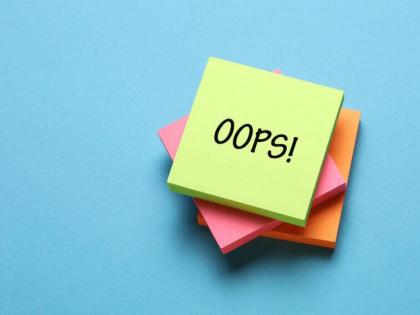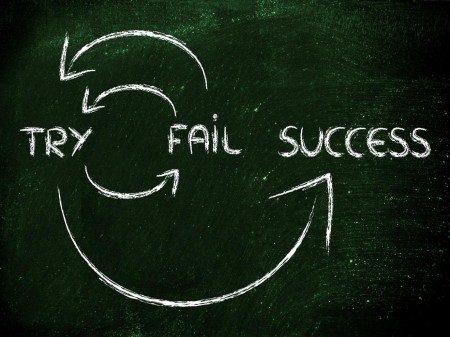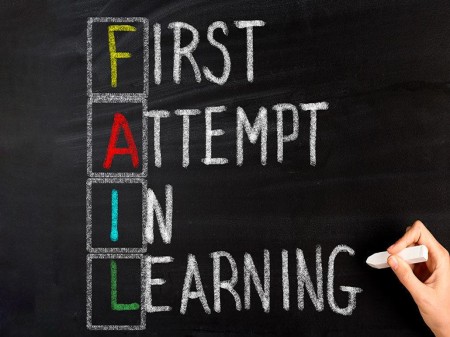"Mistakes are part of life"
By Lokmat English Desk | Published: October 11, 2020 02:17 PM2020-10-11T14:17:42+5:302020-10-11T16:43:49+5:30
Mistakes are a part of life and nobody leads a life bereft of mistakes. So much so that it ...

"Mistakes are part of life"
Mistakes are a part of life and nobody leads a life bereft of mistakes. So much so that it is important to reflect on this topic once in a while. I believe that the earlier we understand this phenomena, the better it will helps us lead a superior life. Hence, I thought it prudent to dedicate one article in this series to our ‘mistakes’. We make and will continue to make mistakes. What makes all the difference is our ability to deal with them, our attitude of not repeating them and our wisdom in avoiding the big ones. Some of us stay casual to an extent that we don’t even end up learning from them. Others on the other hand, beat themselves up over their mistakes making it miserable for themselves. There is a need to review our past stupidities and reduce the possibilities of repeating them.
“All I want to know is where I will die, so I don’t go there” – Anonymous
A remarkable book with the above title written by Peter Bevelin provides examples of pure folly and some lessons on how to make fewer dumb mistakes. And then how to fix them quicker, should we make them. The major lesson is removal of ignorance and the notion that decision making in life is not as much about making brilliant decisions, but avoiding terrible ones. Make no mistake, the book, a study in simplicity and uncommon, common sense, doesn’t ask us to take the easy path in life. It in fact provides a great toolkit to wade through the imminent complexities in our quest to aim really high. I would like to draw your attention to another brilliant book titled ‘The Icarus Deception’ by Seth Godin. It provokes one to fly really high. It says that we are all artists. An artist is one who uses bravery, insight, creativity and boldness to challenge the status quo. The artist (in each one of us) takes the challenge comprehensively and personally. Our journey as an artist will be more fulfilling and effective as we learn to make fewer mistakes.
There is a blog ‘Farman Street’ (FS) that I recommend to every reader. Its motto is to help you master the best of what other people have already figured out! It is said that the stupid learn from one’s own mistakes while the wise learn from those of others. FS provides tools to make better decisions, avoid regrets, and close the gap between where we are and what is possible. The ideas learnt at FS can be applied to many areas of life – work, leadership, relationships, health, conversations, parenting, etc. In case of a mistake made, as important is the need to pay attention to its cause, is the courage to forgive oneself and come out stronger. Many of us tend to lose confidence and make a poor judgement about ourselves. Charlie Munger said that its amazing the number of mistakes you can make in a long life with things still working out. What should we do when you realise that we have made a mistake. Dale Carnegie said “ Any fool can try to defend his or her mistakes-and most fools do- but it raises one above the herd and gives one a feeling of nobility and exultation to admit one’s mistakes”. To do so in front of ourselves takes wisdom. To do so in front of others takes courage. It is better to point out our own mistakes than have somebody else do it. This allows us to review our mistakes before we commit new ones. And reduce the possibility of repeating the mistake. I have recently begun to experiment spending an hour every week to write down and reflect on one mistake that I have committed during the week – take an outside-in view of the situation, objectively analyse the cause of making the mistake and articulate the learnings from it. This has helped me to not get too hung up on them and over a period of time, I am confident, it will help in shaping my future behavior and decisions.
While we can learn from our mistakes by rubbing our nose in them, we also learn from our successes. However, as Richard Feynman once said “The easiest person to fool is yourself”, lets remember that success can be a lousy teacher, since what we may believe is the outcome of skill, may actually be luck. Objectively reflecting on success, their reasons and the element of skill and luck can be hugely rewarding for future decisions. Its critical though, to avoid and reduce the possibilities of fatal errors. There are all kinds of things that are unfixable once they have occurred. Some simple example of fatal mistakes to avoid include crossing rail tracks, doing drugs, being led into the thrills of gambling, careless choice of life partner, what we do with our children, etc. As written in an earlier article – steadily turning our body from normal to over-weight to being obese and ending up in habits that make it virtually impossible to get to normal again, is another fatal mistake.
Another form of deadly mistake is to go through life with unreasonable expectations. Avoiding the truth or hoping that a problem will go away if you don’t think about it can lead one on the path of regret. Not working on preventing disasters is another fatal folly. Its wiser to spend time building the ark rather than predicting the rain. Another type of fatal error is what Warren Buffett advises against – to risk what we have and need, in order to get what we don’t necessarily need. The affairs of a Kingfisher Airlines or a Gitanjali Gems are good examples of such greed ending up in pain. Guarding ourselves against our own over-confidence is a good way to avoid fatal errors. It’s mostly the expert swimmer who drowns. Steve Irwin, the famous Australian zookeeper and crocodile hunter died in 2006 at a young age of 44 after being pierced in the chest by a stingray barb. Fatal mistakes come as easy to the educated as to the illiterate. Schooling and higher education unfortunately do not include chapters on dealing with or better still, avoiding mistakes.
Of learned fools I have seen ten times ten, of unlearned wise men, I have seen a hundred. – Benjamin Franklin
(This Blog post is contributed by Ms. Isha Kanodia)

